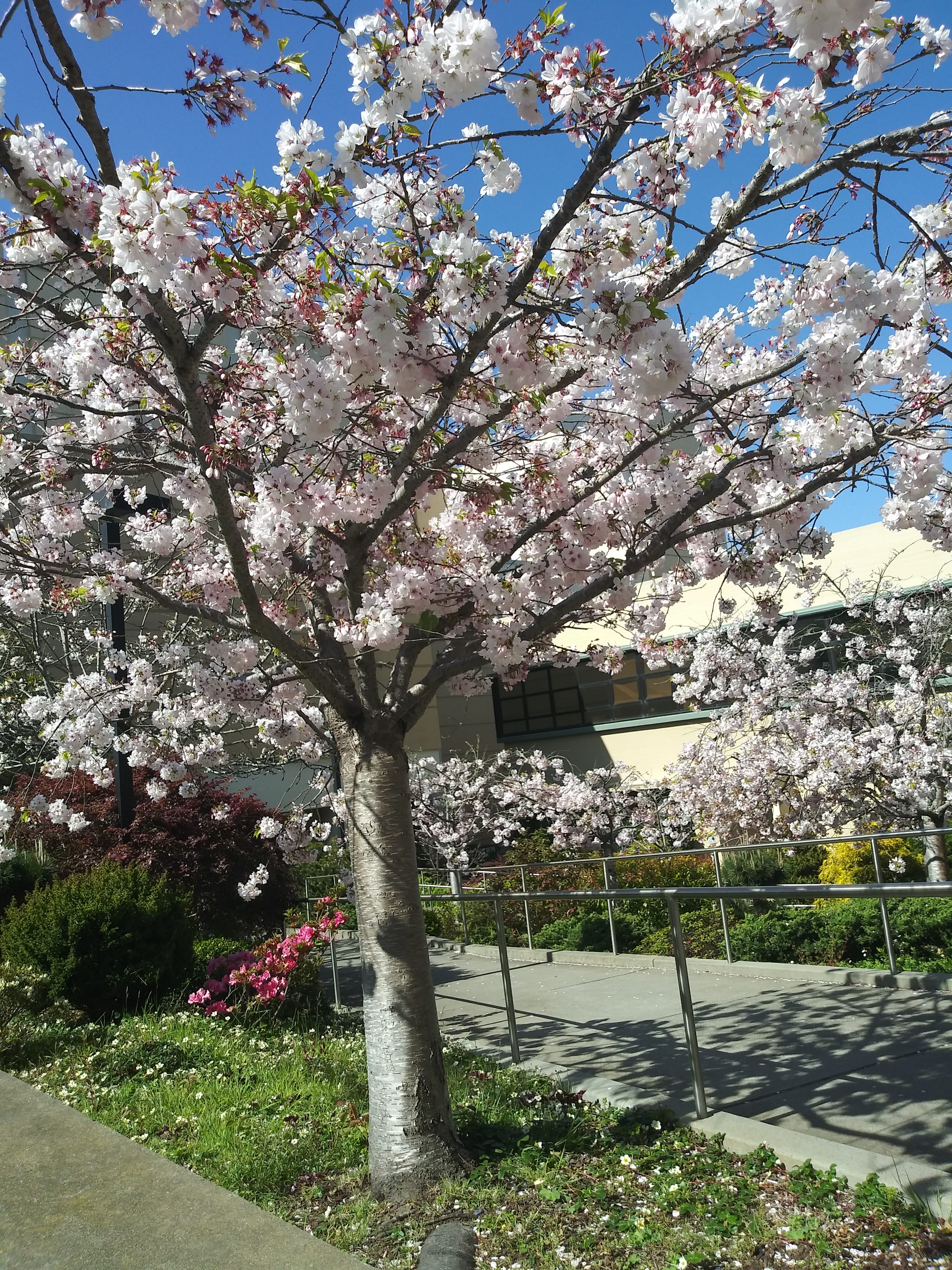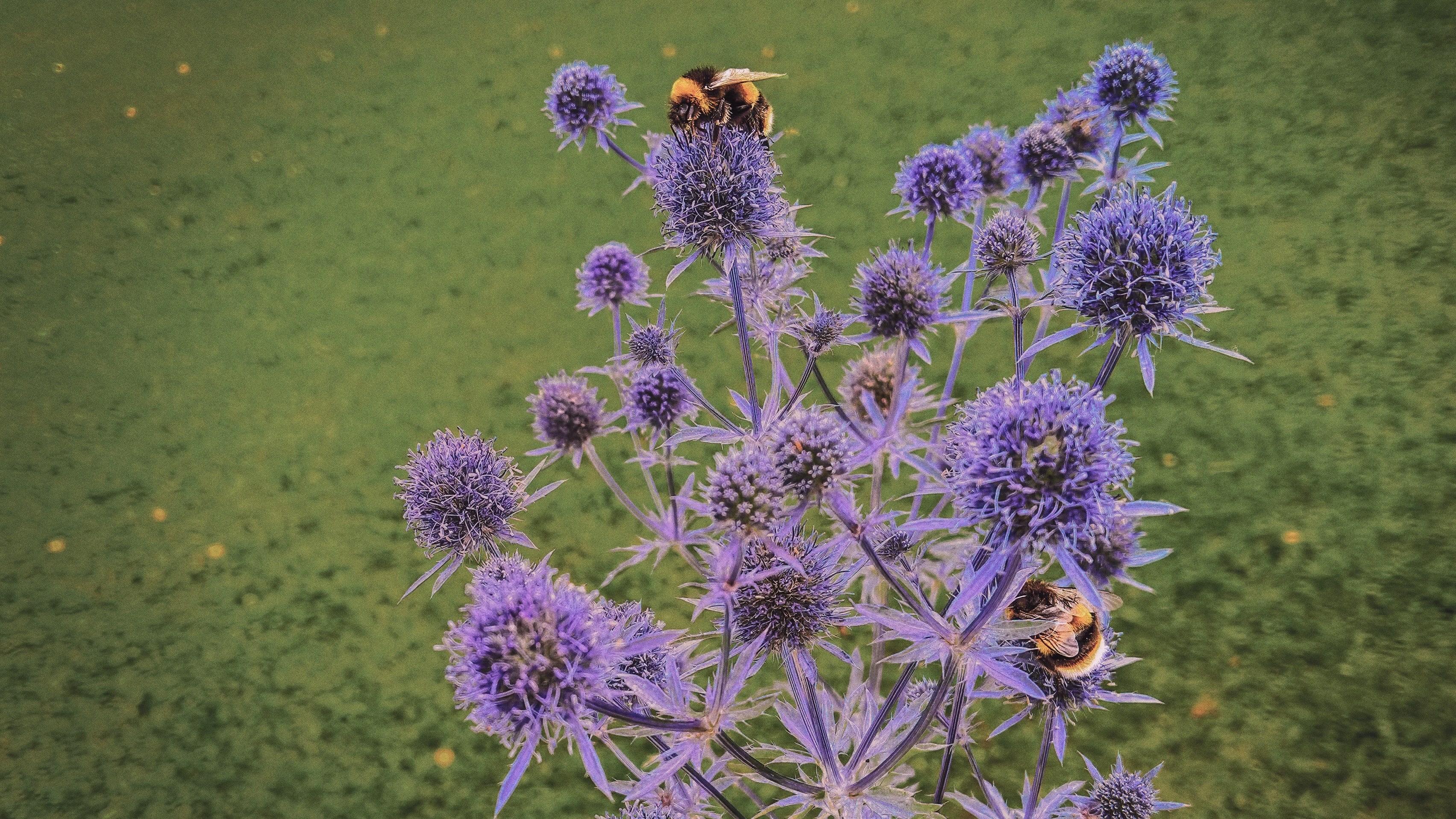Life is Beautiful. But pay attention or you’ll miss it.

I’m celebrating this Spring with flowering cherry trees on the San Francisco State (SFSU) campus. The flowers last about three weeks, and I’ve been sitting with them when I can, enjoying their beauty and sensing the life force exploding through them and their bee partners.
I got to campus early one day, but the bees were there first, and I noticed something interesting about them. When I first approach the trees, I don’t see many bees around them. But the longer I watch quietly, the more bees I see. Soon, I’m amazed by how many there are.
I watch them buzz from blossom to blossom, bringing pollen from male to female organs as they drink the buds’ sweetness. I can see why people call them “busy,” but after a while I sense that they’re not busy. They’re focused; they’re enjoying themselves. They keep doing what they’re doing until they tire; then they stop. It’s very soothing to watch.
I think all life is like those bees. If we take the time to observe quietly, we will be thrilled by how much there is to see, hear, touch, taste and feel. We’ll be ennobled by living things’ beauty and intrigued by the ways they live and work with each other.
Most of the time, though, we miss this whole show. We keep rushing by things, or hurrying to do things to them, lost in thought or in our devices. If we continue to ignore them, we will die without ever having appreciated them. We’ll miss the deep, loving gifts the world is trying to give us. That is how city-dwellers tend to live, seeing Nature as a bunch of lifeless ‘resources’ or as wallpaper we roll by, if we see it at all.
Sadly, many people are imprisoned, literally in jails or figuratively in apartments and offices far from nature. The wonders of life might be hard to find in a concrete landscape. Even those not incarcerated often have our minds in electronic prisons of one kind or another. When was the last time you interacted with a plant or an animal? If your answer is ‘today,’ one point for you, but it’s not enough.
In a society that values doing and having above all else, treats animals and plants as things and people as robots, how do we learn to appreciate the gifts of Nature? I haven’t gotten far with this yet, but I’ve learned a few things:

۰Don’t look for the bees (or whatever you want to see.) You’ll miss them. Just observe and let them come to you.
۰When you see a bird or a plant or some other nonhuman person, stop and breathe. Make yourself comfortable. Try to feel your connection to this living being.
۰Learn more about what you’re seeing. A YouTube video, a book or web page about bees, flowers, trees, or whatever you want to observe can help you see and understand them better.
۰People are part of Nature. Realize everyone you meet has layers of being far beyond the surface.
۰Old people have so much history, places they’ve been, people they’ve known, things they’ve done, wisdom they’ve learned. If you take some time with them, they will love you for it.
۰Children remember stuff that adults have forgotten. It’s all new and wonderful for them. Maybe some of their joy will rub off on you if you let it.
۰Young adults are going through interesting and important struggles, and if you can get them to talk, you might be touched or might be able to help. Interacting with them might give surprising rewards.
۰Use all your senses. Eat slowly and taste more deeply. It slows me way down if I’m mindful of where the food came from. I imagine the food growing and give thanks to the plant (or animal), the Earth and Sun.
۰Listen to the sounds of birds, people, and music. Same with smell and touch; stop and pay attention to them! All senses take us out of our thoughts and put us in touch with reality.
۰Minimize screen time. I mean seriously minimize, like take a day or more off, and never spend more than two hours on without a break. This is the most important thing for me. An hour on Facebook can erase the benefits of two hours of relaxation in Nature.
۰Make gratitude your default response to Nature’s gifts. Plants literally take care of us. They give us their bodies for food and clothing, furniture and housing. They give us beauty, like the cherry trees and bees. If we thank them for making our lives better, we will feel better too. At least, gratitude always does that for me.
A scientifically-minded cynic might say that neither the plants nor the bees care about us at all. They are just doing what Nature programmed them to do in order to survive. There could be some truth in that; nobody knows what goes on in the minds of insects. But as Native American botanist Robin Wall Kimmerer writes in Braiding Sweetgrass, plants and bees do what people in love do. They give us gifts; they make us feel better. We should help them in return, and the very first thing to do is to take time to appreciate them.
— — — — — — — — — — — — — –
A super book on this is Kimmerer, Robin Wall, Braiding Sweetgrass: Indigenous Wisdom, Scientific Knowledge, and the Teachings of Plants Milkweed Editions 2013
Thanks for reading! Follow me on Twitter, on Facebook or Medium.com Hire me for freelancing, editing, or tutoring on Linked In

Thank you for the reminder. Just what I needed. Gives me permission to love and appreciate nature and my senses and to slow down, and all the rest!